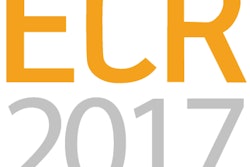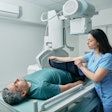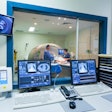
In parts of the U.K., up to a third of consultant radiologist posts remain vacant. To combat these drastic shortages, the Royal College of Radiologists (RCR) is hosting two keynote sessions at the upcoming ECR 2016 in Vienna in the hope that overseas radiologists will relocate.
The average vacancy rate for qualified radiologists across the U.K. currently runs at 16%, meaning one in six consultant posts are unfilled. However, this can range from 0% in parts of London to as high as one in three elsewhere -- the greatest number vacancies being in the Midlands, North of England, Scotland, and West Wales, according to RCR Faculty of Clinical Radiology Vice President Dr. Richard FitzGerald, consultant radiologist at Royal Wolverhampton Hospitals National Health Service (NHS) Trust.
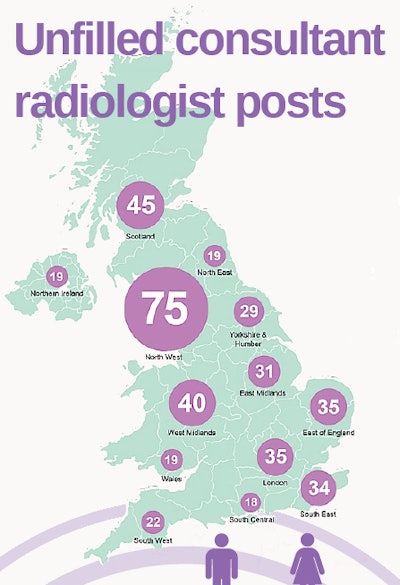 Unfilled consultant radiologist posts in the U.K. in 2014. Courtesy of RCR.
Unfilled consultant radiologist posts in the U.K. in 2014. Courtesy of RCR.The U.K. is ranked with Macedonia in having the lowest number of radiologists per 100,000 of its population in Europe, and way behind the average for Western Europe according to the Clinical Radiology U.K. workforce census report from 2014. In addition, more than 400 consultant radiologist vacancies were advertised in 2015, but only 200 radiology registrars completed specialist training, according to FitzGerald, who points to a need for higher consultant numbers not only in diagnostic imaging but also in interventional radiology.
Aware of this crisis in radiology resources, the U.K. government body Health Education England (HEE) is filming a promotional video using an edited set of several mini interviews with radiologists who have grown up and trained abroad but who are now U.K.-based consultants. The film, to be posted on the RCR website once released, will outline the advantages and disadvantages of living and working in the U.K., as well as provide handy tips on how to adapt to life and radiology practice in the country.
"The government's funding of this film shows that this issue really matters. We wish to encourage trained and qualified radiologists abroad to consider coming to work in the U.K.," he said.
For its part, the RCR's growing Web resources on relocation to the U.K. include advice and information on visas, registration, adapting to U.K. life, the structure and culture of the NHS, and its radiology practices. However, he underlined the RCR did not advertise specific jobs, or recruit and vet radiologists for positions.
"The RCR exists chiefly to promote better radiology for patients, and a shortage in manpower impacts this goal," he said. "Our role in this area is to better prepare radiologists from abroad about what to expect, and to provide easy access to helpful resources."
He believes departments recruiting foreign radiologists should provide support for newcomers. If this isn't offered, hospitals risk their recruits floundering at work or leaving, and this would result in problems for the department and risks for the patient. To ensure recruits feel they are a valued team member, it is vital that other local radiologists befriend and mentor them, according to FitzGerald.
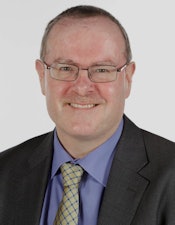 The RCR's role is to promote better radiology for patients, and a shortage of consultants jeopardizes this goal, according to Dr. Richard FitzGerald.
The RCR's role is to promote better radiology for patients, and a shortage of consultants jeopardizes this goal, according to Dr. Richard FitzGerald.But why would foreign radiologists, notably those from relatively well-off European countries, opt to work in the U.K.? High standards, interesting multidisciplinary work, and feedback from clinicians on radiology reports all contribute to making posts highly desirable, he explained.
"The U.K.-based radiologist is not just a reporting cog in a factory. There is real connectivity with patient outcomes. The accuracy of their conclusions is valued and recognized as is their role in making a difference to patient management," FitzGerald noted, adding that this high level of involvement in patient care and recognition from multidisciplinary clinical case teams happened more in the U.K. than elsewhere. "Other advantages include the opportunity to specialize with support from talented radiographer teams, state-of-the-art equipment, and well-established quality assurance in departments."
Presentations by consultant radiologists Dr. Carolina Lopez and Dr. Dorota Wach (Bedford Hospital NHS Trust) will take place on 3 and 4 March during the RCR sessions at ECR 2016, allowing delegates the chance to hear about their personal experiences as overseas radiologists. There will be tips for those tempted to relocate to the U.K. Besides the abundance of available posts away from London, applicants can enjoy lower rents, house prices, and general living costs. Furthermore, international airports throughout the U.K. provide most regions with easy access abroad.
Also, pay for radiologists can be considerably higher than it is in other comparable countries, including Germany, FitzGerald said, and departments tend to be more egalitarian and less subject to a starkly hierarchical pay structure; NHS consultants are all on the same pay scale with small top ups paid to clinical directors. Other benefits include a good pension scheme and generous study leave allowance.
"Radiologists should also remember that it is not a life sentence," he concluded. "Spending a few years in the U.K. would be an enriching experience, particularly for young radiologists who have yet to put down roots."


